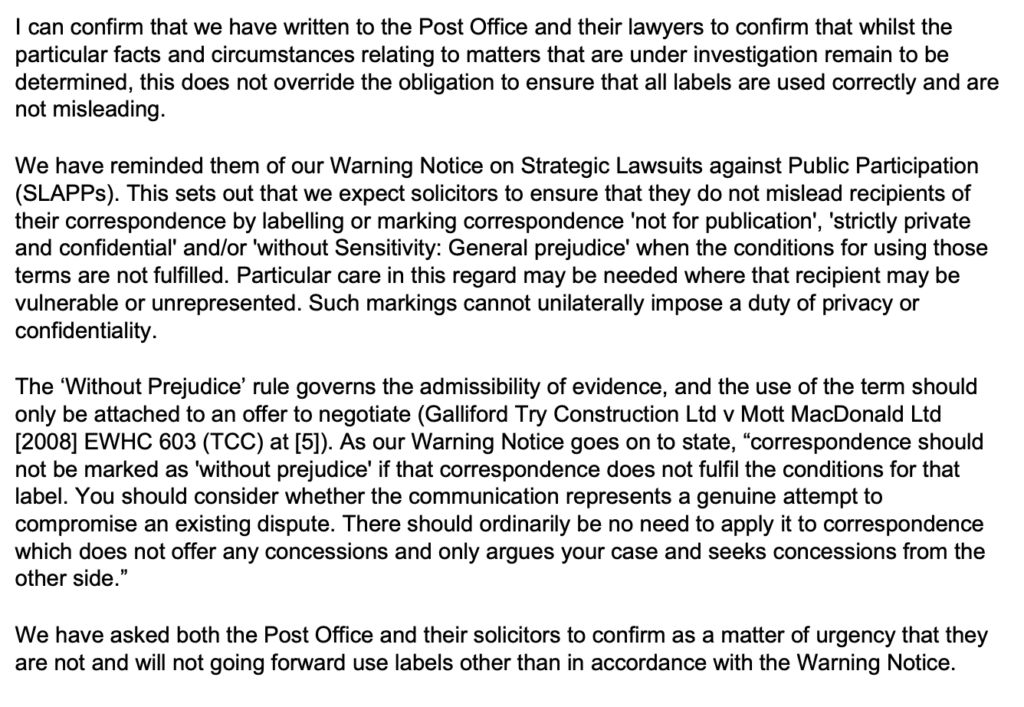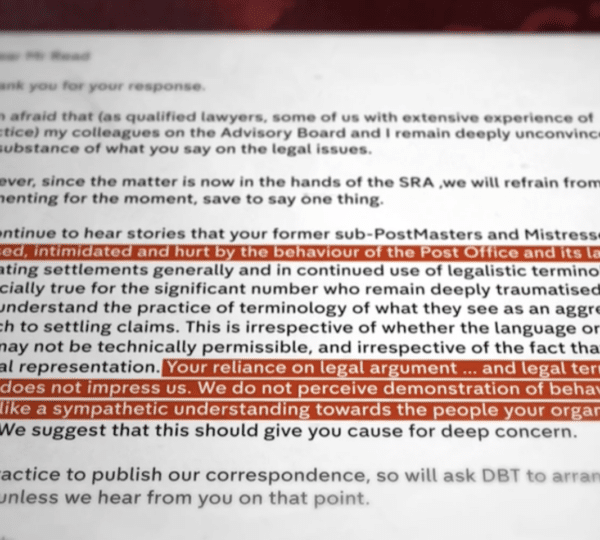The Post Office’s offers of compensation under its “HSS” settlement scheme were often insultingly low. But it falsely claimed the offers were confidential, and couldn’t be shown to anyone. That resulted in most being accepted; in 90% of cases the postmasters didn’t even take legal advice. The Solicitors Regulation Authority has now ordered the Post Office to stop making this false confidentiality claim. But it’s too late – most of the settlements are now completed. The Post Office has again succeeded in using unethical legal tactics to minimise compensation payouts.
We revealed the Post Office’s false confidentiality assertion back in May 2023. The Post Office’s response was to assert that its position was correct, but provide no justification. The Times and then Channel 4 reported on the story, with the Post Office still refusing to justify its position.
The Horizon Compensation Advisory Board then took the matter up – it’s published its correspondence with the Post Office and the SRA. The outcome is that the SRA has ordered the Post Office to cease its behaviour, and the Post Office has reluctantly taken a “policy decision” to do so.
The correspondence between the Post Office and the Advisory Board suggests the Post Office never had any genuine legal or commercial basis for its approach. The purpose was to minimise compensation. The Post Office’s legal response to the scandal has been notable for its unethical legal tactics throughout;1 this was just another.
What the Post Office did
When the Post Office made settlement offers to postmasters under its “HSS” scheme, it included this paragraph saying that postmasters couldn’t discuss the offer with anyone:

These were mostly old, vulnerable, people who’d suffered tremendously. Preventing them speaking to anyone had consequences. Postmasters weren’t able to compare compensation terms with each other. They weren’t able to speak to family or friends (who might have suggested they speak to a lawyer). And they weren’t able to write to their MP, or speak to reporters.
Probably as a result, 90% of postmasters never instructed a lawyer.2 Many received derisory amounts of compensation.
I believe the Post Office’s imposition of confidentiality was responsible for all this. And it was a lie. The letters weren’t confidential at all.
Where the Post Office was making an offer, then it was perfectly proper for it to say its offer is made “without prejudice”. That’s a common law doctrine that prevents statements made in settlement discussions from being adduced as evidence in court. But “without prejudice” is a form of legal privilege, and not a rule of confidentiality – the claim that the “without prejudice” label stopped the postmaster showing the letter to third parties was false.
Worse, the paragraph was included on all settlement offers, even “nil offers” where the Post Office was offering nothing. In those cases it was entirely improper to claim the letter was “without prejudice”, because it wasn’t an attempt to settle a dispute, just a denial of liability.
There was never anything to stop recipients of the HSS offers from sharing them with other postmasters, friends, or journalists, or indeed publishing them (although it would be advisable to redact identifying details, to prevent any future court from seeing publication as an attempt to circumvent the “without prejudice” rule).
The Post Office’s lawyers surely knew this. I believe this was a deliberate and cynical tactic to minimise compensation.3 It was a breach of professional ethics by the lawyers involved – the in-house lawyers at the Post Office, and also their external lawyers, Herbert Smith (if they were involved – it’s not clear if they were). That breach is all the more serious given that the lawyers knew that the vast majority of the recipients of these letters would be unrepresented.
The Post Office’s defence
The Post Office provided several defences in correspondence with the Advisory Board in December 2023 and January 2024:
![WP communications are a form of legal privilege, which only subsists for as long as the communications which are subject to it remain confidential. The reason the offers are WP is to allow the
kind of commercial settlement negotiations that we undertake on the HSS. We designed the
scheme to be as postmaster centric as possible and as [name of senior external lawyer redacted]
has recently commented, the very low evidential burden on postmasters means that we can make
the sorts of offers that a court would not be in a position to make. While we are in discussion with
a postmaster, those discussions remain confidential until such time as we have reached a settlement. This is very normal and protects both sides. None of our claimant firms have challenged
the point as they understand the benefit to both parties and the fact that there is no disadvantage
to their clients.](https://taxpolicy.org.uk/wp-content/uploads/2024/03/image-38-1024x304.png)
This explains why the letters are “without prejudice”, and why the Post Office want the communications to be confidential, but it doesn’t explain why the Post Office thinks that the letters are confidential.
“Nobody else has complained” is not a legal argument, and in any case it’s the unrepresented postmasters who suffered prejudice.
Then:

This is deeply patronising. Postmasters should be able to choose whether or not to share their offers, and make their own decisions about their privacy. But in any case, this isn’t a legal defence of the Post Office’s position.
And here’s the Post Office’s defence of claiming that “nil offer” letters were “without prejudice”:

A nil offer is not an offer of settlement and the “without prejudice” doctrine does not apply. The Post Office’s wish “to be consistent” is not relevant.
This correspondence suggests to me that the Post Office never had any genuine legal or commercial basis for its approach. It was always about minimising compensation.
The SRA response
The SRA doesn’t normally write to lawyers and tell them to stop doing something; that’s not its role. It investigates solicitors where there may have been a breach of SRA standards and regulations, and in extreme cases it intervenes to shut down firms.
But in this case the SRA has acted decisively – this is from their letter to the Advisory Board of 31 January:

Note the key points: the SRA says that “without prejudice” cannot unilaterally impose a duty of confidentiality, and that in any event the term should not be used when the Post Office is asserting it has no liability.
The Post Office’s response
The Post Office has now said it’s made a “policy decision” to cease the “without prejudice” labelling. It is not even trying to defend its previous position that the labelling enabled it to unilaterally assert that its offers were confidential.

and:

This is disingenuous. Nobody ever doubted that it was acceptable to label settlement offers “without prejudice”, so the fact the Post Office received external legal advice on this point tells us nothing.
But look at what is missing: a statement that the Post Office received external legal advice that its assertion of confidentiality was appropriate, or that it was acceptable to label nil offers “without prejudice”. The obvious inference is that the Post Office wasn’t acting on the basis of external legal advice at all. But it proceeded to mislead postmasters, and continued even after being put on notice that its position was wrong.
If that is correct, it’s scandalous.
What should happen next?
At least 1,726 settlements were agreed with postmasters who never received any legal advice, off the back of settlement offers that falsely claimed to be confidential. The Post Office behaved oppressively, and all these settlements should be reopened, with the Post Office having no role in the settlement process.
The SRA’s investigation into the Post Office’s internal and external lawyers is necessarily highly complex and will, I expect take years to resolve. The “without prejudice” issue, by contrast, is freestanding and should be relatively straightforward. I hope that the SRA can accelerate it.
Thanks to the Advisory Board for pursuing this matter, and The Times and Channel 4 for reporting it. Thanks also to B and K for their assistance on the law of confidence and the “without prejudice” doctrine, and C and X for sharing their practical experience of confidentiality provisions in settlements.
Image of Advisory Board letter © Channel 4 News.
Footnotes
Even a completely meritless application for a judge to recuse himself on the basis he was biased, which the Court of Appeal described as “without substance”, “fatally flawed” and “absurd”. ↩︎
As of 4 April 2023, 1,924 settlements had been entered into. The Post Office agreed to cover limited legal fees for postmasters receiving offers, but as of that date the Post Office had covered legal fees of only 198 (see our FOIA correspondence, linked here). Given the age and limited resources of most of the postmasters, it is reasonable to take from these figures that around 90% of the postmasters had no legal representation. ↩︎
Settlement offers aren’t usually stated to be confidential at all, for the very good reason that confidentiality can’t be unilaterally imposed. Final settlements, on the other hand, often are confidential (sometimes improperly), but that is typically achieved by a separately negotiated NDA/confidentiality agreement, not just an assertion by one party. There would usually be a list of people to whom disclosure could be made (such as family members, lawyers and insurers). Two experienced defendant tort barristers have told they would personally be uncomfortable negotiating a confidentiality agreement if the claimant was unrepresented. So the behaviour of the Post Office was as unusual as it is troubling. ↩︎


8 responses to “The Post Office has finally stopped intimidating postmasters into silence; but it’s too late”
Given the deeply flawed process that coerced SPMs into accepting derisory offers, government should step in asap. Stop messing about and overturn all prosecutions as well as previous settlements, and make one off tax-free across the board compensation payments. The current process is an embarrassment.
It’s beyond belief how they could genuinely think that 1,726 Postmasters had all gone off the rails in such a short period.
I’ve still not been able to find out prosecution rates in the 1980s or 1990s before Horizon- surely that number alone would have been enough to show something was deeply wrong?
The apparent explanation is that they thought that SPMs were committing fraud before Horizon, but that their limited! systems could not prove it.
(No, I’m not saying that was reasonable)
I am full of admiration and respect for your careful detailed analysis and campaigning for the postmasters – I still dont understand why with all the evidence now available that criminal charges have not been brought against those who appear to have broken the law.
If the SPMs were induced to enter into these settlement agreements by the POs misrepresentation of confidentiality there appears to be some authority that those agreements can be rescinded.
Hayward (Respondent) v Zurich Insurance Company plc (Appellant) [2016] UKSC 48
Also this, Terms of Reference of the Inquiry, C :
Assess whether Post Office Ltd has learned the lessons from the criticisms made by Mr Justice Fraser in his judgments following the ‘Common Issues’ and ‘Horizon Issues’ trials and those identified by affected postmasters and has delivered or made good progress on the organisational and cultural changes necessary to ensure a similar case does not happen in the future.
https://www.postofficehorizoninquiry.org.uk/publications/terms-reference
Namely, “made good progress on the organisational and cultural changes necessary to ensure a similar case does not happen in the future.”
Based on how they are still hoodwinking the Postmasters, how have they changed adequately?
I think there may be a typo where you write “without privilege ” rather than “without prejudice” at one point.
(As of 13:00 GMT, 30 March)
Keep up the good work!
thank you! Yes, corrected.